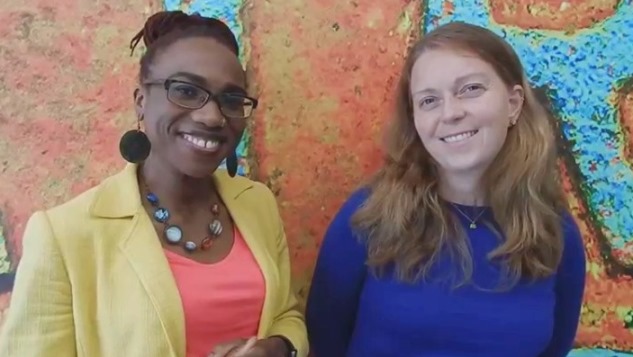
Pictured: Ijeoma Nnodim, M.D. '08, left, and Kristiana Kaufmann, M.D., '05, are co-founding executive directors of the Global Health and Urban Equity program.
Strengthening patient care with a dose of cultural humility is the projected outcome of a global health initiative for learners across all specialties in the Wayne State University School of Medicine.
Global Health and Urban Equity, or GLUE, provides a greater awareness of cultural and socioeconomic factors and emphasizes the importance of communication skills in medical practice.
In its first semester, standing-room only crowds attended the monthly seminars that follow the Consortium of Universities for Global Health core competencies for global health practitioners.
Assistant Professor of Internal Medicine-Pediatrics Ijeoma Nnodim, M.D. '08, said GLUE gained CUGH membership with the assistance of Ahmad Ezzeddine, associate vice president of educational outreach and international programs, and Stephen Lanier, vice president for research. CUGH connects the group with a worldwide network of 145 academic institutions, program materials and funding opportunities.
Detroit is home to significant health disparities and inequities that reflect global realities, making the GLUE seminars a unique opportunity for bidirectional service, learning and research, Nnodim says. She is co-founding executive director of the program, along with Assistant Professor Kristiana Kaufmann, M.D. '05, and Assistant Professor Vijaya Kumar, both of Emergency Medicine.
"The university's location within the Detroit community places us in a unique position to exert innovative and visionary leadership in local and global health initiatives," Nnodim said. "Because of this, we need to be the leader of care for the vulnerable populations in our midst."
GLUE was developed by the WSU Global Health Alliance to meet the growing needs of students and physicians to acquire global health experiences by providing a well-structured program to coordinate and support their endeavors.
To receive a certificate of completion, students must participate in the monthly seminars, a research/capstone project, field experiences and symposia.
The overwhelming response to GLUE has led Nnodim and GHA colleagues to begin developing a pipeline that extends to undergraduates involved in global health issues.
The goal is to change the focus of global health initiatives to be one that is equal and bidirectional in the exchange of innovations that global scholars can apply to solving domestic problems.
This article originally appeared at oip.wayne.edu. The Office of International Programs leads Wayne State's global engagement by creating opportunities that foster international education and research, facilitate the exchange of individuals and ideas that promote global competencies and citizenship and provide resources that support the expansion of the university's global agenda.